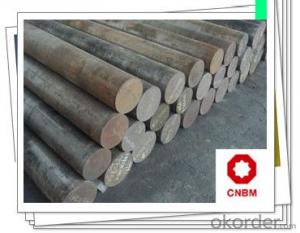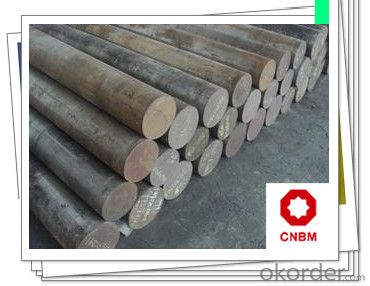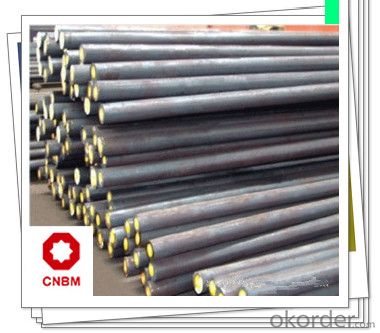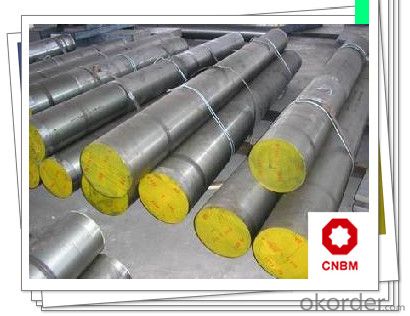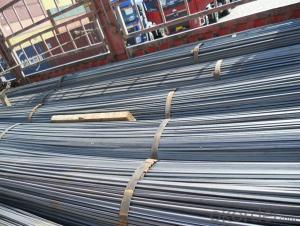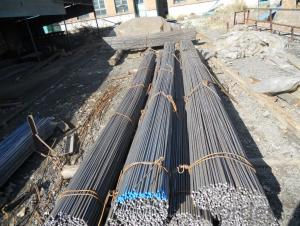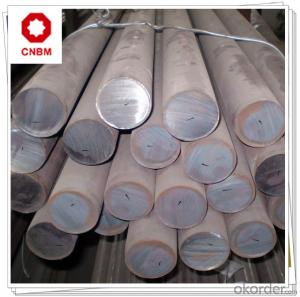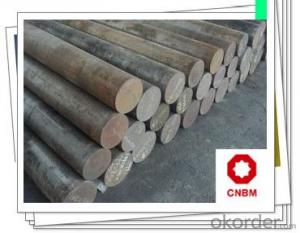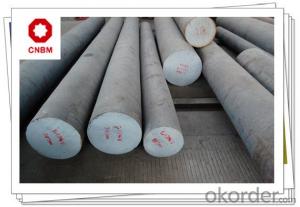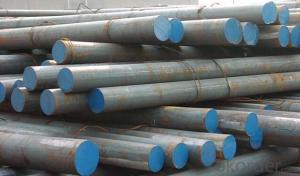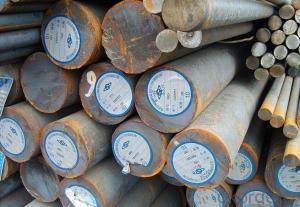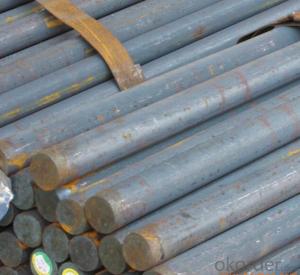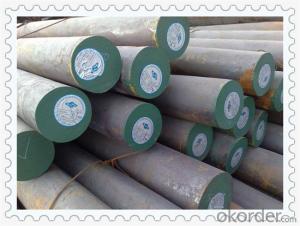Carbon Structural Steel Round Bars ASTM A36
- Loading Port:
- Shanghai
- Payment Terms:
- TT OR LC
- Min Order Qty:
- 25 m.t.
- Supply Capability:
- 120000 m.t./month
OKorder Service Pledge
OKorder Financial Service
You Might Also Like
Carbon Structural Steel Round Bars ASTM A36
PRODUCT SPECIFICATION
1, Chemical Composition %
| Grade | C | Si | Mn | S | P | Cr | Cu |
| ASTM A36 | ≤0.25 | ≤0.40 | 0.80-1.20 | ≤0.050 | ≤0.040 | ≥0.30 | ≥0.20 |
2, Diameter: 9mm - 80mm
APPLICATION
1. Manufacturing of mechanical parts
2. Welding structure building
3. Bridge engineering with higher quality requirements
PRODUCT MAIN POINTS
1, Heat Treatment: normalizing, annealing, tempering, quenching
2, Surface Treatment: black, grinding, bright, polish
3, Product Process: hot rolled, cold drawn, forged
FAQ
1, Payment Terms:
30% T/T deposit & 70% T/T before delivery.
Irrevocable L/C at sight
2, Trade Terms:
EXW, FOB, CIF, CNF
3, Delivery Time:
Normally 30-40 days. According to quantity.
4, Manufacture or Trading Company:
CNBM is a state-owned fortune global 500 trading company. We have intergrated supply system.
There are about 20 overseas locations in different countries.
PRODUCT SHOW
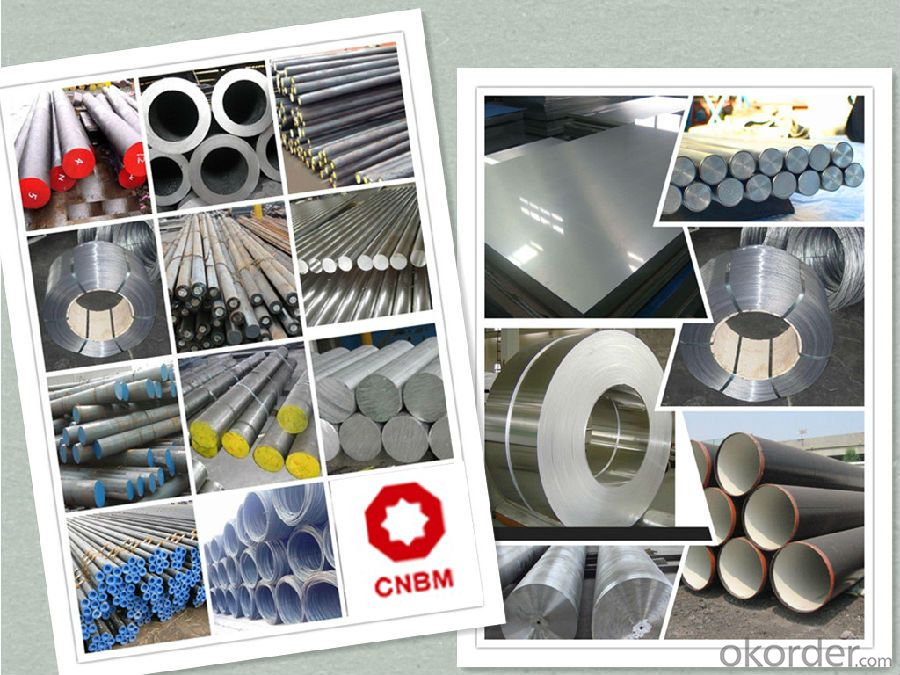
ABOUT US


- Q: How do you measure the hardness of a steel round bar?
- The hardness of a steel round bar can be measured using various methods, with the most common method being the Rockwell hardness test. This test involves applying a specific load to an indenter and measuring the depth of the indentation left on the material's surface. To measure the hardness of a steel round bar using the Rockwell hardness test, the following steps can be followed: 1. Select the appropriate Rockwell scale for the steel being tested. The most commonly used scales for steel are HRC (Rockwell C) and HRB (Rockwell B). 2. Clean the surface of the steel round bar to remove any dirt, oil, or contaminants that could affect the accuracy of the test. 3. Place the steel round bar on a flat and stable surface, ensuring it is properly supported to prevent any movement during testing. 4. Select the appropriate indenter for the chosen Rockwell scale. For HRC, a diamond cone indenter is typically used, while for HRB, a hardened steel ball is used. 5. Apply a preliminary minor load to the indenter, typically 10 kgf (kilogram-force) for HRC and 3 kgf for HRB. This helps ensure proper contact between the indenter and the material's surface. 6. Apply the major load, which is specific to the chosen Rockwell scale. For HRC, it is typically 150 kgf, while for HRB, it is usually 100 kgf. 7. Allow the major load to dwell for a specific period, typically 15 seconds, to ensure proper indentation. 8. Release the major load while keeping the minor load applied. This allows the indenter to partially recover, reducing the depth of the indentation. 9. Measure the depth of the remaining indentation using a microscope or a specialized Rockwell hardness testing machine. The measured value corresponds to the hardness value on the chosen Rockwell scale. It is important to note that the Rockwell hardness test is just one of several methods available to measure the hardness of a steel round bar. Other methods, such as the Brinell hardness test or the Vickers hardness test, may also be used depending on the specific requirements of the application.
- Q: Can steel round bars be used in automotive applications?
- Yes, steel round bars can be used in automotive applications. Steel round bars are commonly used in various automotive components and systems due to their strength, durability, and versatility. They can be used in the manufacturing of engine parts, suspension components, drive shafts, axles, and other structural parts of vehicles. Steel round bars offer excellent mechanical properties, including high tensile strength and good resistance to impact and fatigue, making them suitable for withstanding the demanding conditions experienced in automotive applications. Additionally, steel round bars can be easily machined, welded, and formed into the desired shape, allowing for efficient manufacturing processes in the automotive industry.
- Q: Are steel round bars available in different lengths?
- Yes, steel round bars are available in different lengths. Steel round bars come in various lengths to accommodate different needs and applications. The length options can vary depending on the supplier or manufacturer. Common lengths for steel round bars range from 6 to 12 feet, but custom lengths can also be obtained through special requests. The availability of different lengths allows for greater flexibility in construction and fabrication projects, as it enables the bars to be cut or modified to specific requirements.
- Q: What is the difference between cast iron and round steel?
- Cast iron is composed of iron ore by crushing and grinding into powder, into the furnace after high temperature calcination into liquid (commonly known as iron) and then poured into the special mould after cooling into ingot is also called billet or iron, iron is the main component of alloy is composed of iron, carbon and silicon.
- Q: Q235 and mechanical properties of hot rolled steel cold drawn steel have what difference, Q235 hot rolled steel with 12 combined shearing machine has a number of very hard, the damage of the blades, why
- First of all, Q235 refers to the yield strength, is a heat treatment method, commonly used in thin steel plate material,
- Q: How do steel round bars compare to aluminum or steel tubing?
- Each material, steel round bars, aluminum tubing, and steel tubing, possesses distinct properties and applications. Therefore, it is crucial to comprehend the characteristics of each material prior to making a comparison. Steel round bars consist of solid cylindrical bars crafted from steel. Renowned for their strength and durability, they are suitable for heavy-duty applications. These bars exhibit exceptional tensile strength and can withstand significant levels of stress and pressure. Consequently, they find extensive use in construction, manufacturing, and engineering projects where strength and structural integrity are paramount. Moreover, steel round bars exhibit high resistance to corrosion, rendering them appropriate for outdoor and marine applications. In contrast, aluminum tubing is constructed using lightweight and corrosion-resistant aluminum. This material is recognized for its outstanding thermal and electrical conductivity. It is commonly employed in applications where weight reduction is crucial, such as in the aerospace and automotive industries. Additionally, aluminum tubing is frequently utilized in the construction of heat exchangers and electrical wiring systems due to its conductivity properties. Steel tubing, similar to steel round bars, is composed of steel, but it possesses a hollow structure. Known for its versatility and wide range of applications, steel tubing is available in various shapes and sizes, such as round, square, and rectangular, enabling the creation of diverse structural designs. Construction, automotive manufacturing, and industrial applications frequently employ steel tubing due to its high strength and rigidity, which make it suitable for applications necessitating structural support or the ability to endure heavy loads. When comparing the three materials, steel round bars outperform aluminum and steel tubing in terms of strength and durability. Consequently, they are ideal for heavy-duty applications that demand substantial strength and structural integrity. However, steel round bars may be heavier and more costly than aluminum tubing, which is often favored for lightweight applications. Conversely, steel tubing offers versatility in shape and size, permitting greater design options. Ultimately, the selection between steel round bars, aluminum tubing, and steel tubing hinges on the specific requirements of the application, including factors such as strength, weight, cost, and corrosion resistance. It is essential to meticulously evaluate these factors and seek advice from experts to determine the most suitable material for a given project.
- Q: What are the different finishes available for steel round bars?
- Steel round bars are available in several finishes, each serving a specific purpose and offering distinct benefits. Some commonly used finishes include: 1. Hot Rolled: By heating the steel above its recrystallization temperature and rapidly cooling it, a rough and scaly surface texture is achieved. This finish provides excellent corrosion resistance and durability. 2. Cold Rolled: The steel is rolled at room temperature, resulting in a smooth and polished finish. Cold rolled steel round bars are known for their precise dimensions, tight tolerances, and improved surface finish. 3. Bright Drawn: This finish involves subjecting the steel round bars to a drawing process, where they are pulled through a die to achieve the desired shape and size. It leaves the surface smooth, bright, and free from imperfections. 4. Polished: Polishing is typically done after cold rolling or drawing the steel round bars. Abrasive materials or chemical treatments are used to remove surface imperfections and create a highly reflective finish. Polished steel round bars are commonly used for decorative purposes. 5. Ground: Grinding is a process where abrasive wheels are used to remove surface imperfections or irregularities from the steel round bars. This results in a smooth and even finish, making the bars suitable for applications requiring tight tolerances and uniformity. 6. Galvanized: Galvanizing involves dipping the steel round bars in a bath of molten zinc, creating a protective layer that prevents corrosion and increases their lifespan. This finish is ideal for outdoor applications or environments with high humidity or moisture. These various finishes offer different properties and appearances, allowing steel round bars to be used in industries such as construction, automotive, manufacturing, and engineering. It is important to consider the specific requirements and conditions of the intended use when selecting the appropriate finish for steel round bars.
- Q: Can steel round bars be painted or coated?
- Yes, steel round bars can be painted or coated. Painting or coating steel round bars is a common practice to enhance their appearance, protect them from corrosion, and provide additional functionality. The process typically involves cleaning the surface of the bars to remove any dirt, grease, or rust, and then applying a primer or base coat followed by a topcoat or finish. The type of paint or coating used will depend on the specific requirements of the application, such as the desired color, level of protection, or resistance to environmental conditions. Additionally, certain coatings can provide specific properties like anti-slip, heat resistance, or chemical resistance. Overall, painting or coating steel round bars is an effective way to improve their aesthetics and durability.
- Q: What is the difference between a peeled and a centerless ground steel round bar?
- A peeled steel round bar involves the removal of the outer surface to achieve a smooth and precise finish. This is typically done using a peeling machine. The purpose of this process is to eliminate any imperfections or scale on the bar's surface, resulting in a polished appearance. Additionally, the peeled round bar goes through a sizing process to ensure accurate dimensions. This makes it suitable for various applications where a smooth surface and precise dimensions are important. In contrast, a centerless ground steel round bar is achieved through the use of a centerless grinding machine. This process entails feeding the bar through grinding wheels that rotate at different speeds. Material is removed from the outer diameter of the bar to attain the desired size and surface finish. Centerless grinding offers tight tolerances and precise sizing, making it suitable for applications that demand high precision and accuracy. In summary, the primary distinction between a peeled and a centerless ground steel round bar lies in the method employed to achieve the desired surface finish and dimensional accuracy. While both processes result in a smooth and precise bar, peeling eliminates material from the outer surface, whereas centerless grinding removes material from the outer diameter. The choice between the two depends on the specific requirements of the application, as well as the desired surface finish and dimensional accuracy.
- Q: What are the advantages of using maraging steel round bars?
- Maraging steel round bars offer several advantages. Firstly, they possess exceptional strength and hardness, making them ideal for applications requiring high-performance materials. Additionally, maraging steel round bars have excellent toughness and resistance to fatigue, ensuring durability under demanding conditions. They also exhibit good corrosion resistance, reducing the risk of degradation over time. Furthermore, maraging steel is known for its machinability and ease of welding, facilitating efficient processing and fabrication. Overall, these advantages make maraging steel round bars a preferred choice in industries such as aerospace, defense, and tooling.
Send your message to us
Carbon Structural Steel Round Bars ASTM A36
- Loading Port:
- Shanghai
- Payment Terms:
- TT OR LC
- Min Order Qty:
- 25 m.t.
- Supply Capability:
- 120000 m.t./month
OKorder Service Pledge
OKorder Financial Service
Similar products
Hot products
Hot Searches
